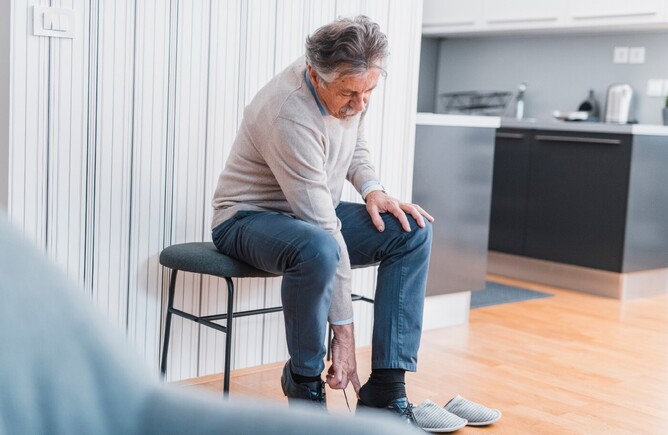By the time you reach 80 years of age, you’ll have taken an average of over 216 million steps, with the same pair of feet carrying you through each step. That’s an astonishing demand on our feet - but thankfully, they don’t do it alone. Our feet rely heavily on the support and comfort from our shoes and socks which become the new ‘ground’ on which our feet stand, influencing and guiding how our feet move, the pressure they’re exposed to, how stable we feel - and ultimately, how long we can stay mobile and independent.
Here’s why the shoes you wear should be a very important and carefully considered decision, as opposed to an afterthought - especially for retirees and those in their golden years.
Why Your Shoes Matter, A Lot
With clever marketing positioning footwear as an item of style and fashion, it’s easy to lose sight of the greater purpose of footwear: to keep us active, mobile and independent while reducing the risk of foot and leg pain and injuries. While many assume that this only applies to younger adults participating in sports and recreational activities, our shoes are just as important - if not more so - in our later years. This is where they help to:
Reduce Pressure Wounds
As we grow older, the fatty padding protecting the bones in our feet reduces, our joints can become more prominent and rigid. This is where being on our feet can create pressure wounds - especially if we’re wearing firm, unsupportive shoes that are adding to the pressure problem. Good shoes, however, can help redistribute the pressure away from the joints, spreading it more evenly, and cushion the foot to help prevent or manage pressure sores.
Increase Stability
Over time, the ligaments and connective tissues responsible for keeping our joints stable loosen and weaken. This often happens around the ankle joint, leaving us feeling less stable on our feet, feeling like our ankles are unsteady or may give way, and leaving us vulnerable to ankle sprains. Good shoes can help restore some stability by keeping our ankles supported in place. For many, this supported feeling gives them a great deal of confidence on their feet, allowing them to do more walking than they’d previously feel confident in trying.
Prevent Ingrown Toenails
Shoes with a shallow and narrow toe box (surrounding the toes) can encourage ingrown toenails by squeezing the toes and driving the nail into the skin. Good shoes can help prevent ingrown toenails by leaving the right amount of room for the nails to grow naturally without restrictions.
Prevent Nail Trauma
Nails that are constantly rubbing against or hitting against the shoe can cause nail trauma. This looks like discolouration and changes to the nail itself which is aesthetically unpleasing - like nail thickening, darkening, bruising, flaking and the like. Sometimes, nail trauma closely resembles a fungal nail infection. Good shoes should not cause any nail trauma, keeping your feet looking and feeling great.
Minimise Foot And Leg Aches
The forces placed on our feet when we walk, regardless of how long or little, can be exhausting - especially if our shoes are making our feet and legs work harder than they should be. The result is aches from tired muscles. Good shoes have the right features, which often include supportive footbeds, that promote optimal muscle function without overdoing it, leading to less aches and pain.
Good Socks: Often Overlooked, But Absolutely Invaluable
There’s a saying that your shoes can only work as well as the socks inside them, and there is definitely some truth in this. Your socks matter more than people realise. There have been many problems created from protruding seams in the socks causing pressure and friction, from allowing moisture to be trapped and not wicked away causing Athlete’s foot fungal infections and fungal nail infections, to overly tight socks leading circulatory problems that affect foot health - and these are just the beginning.
Carefully consider:
- The materials - you want to keep your feet cool and dry, wicking moisture away from the feet and helping prevent blisters, which is where cotton socks can be a problem.
- Antibacterial properties - would you benefit from your socks having antibacterial properties like with bamboo socks?
- Circulation - do you want your socks to have compression properties to help promote circulation around your feet?
- Durability - your socks should be made to last, you shouldn’t be quickly wearing them out or having holes in your socks
- Cushioning - socks with added cushioning to areas like the heel or beneath the ball of the foot can best support the shoe in redistributing pressure and improving comfort
- Diabetes - if you have diabetes, choose socks that are seamless and won’t pose a risk to your feet
- The right fit - when we think of socks being ‘one-size-fits-all’, we miss that socks that are too large or loose in the wrong areas can lead to bunching around our toes, feet and ankles, which can lead to blisters and pain
Choosing The Right Shoes & Socks
Choosing the best shoes can be difficult. It’s hard to know where to start, which type of shoes will be best for the activities you want to do, and having too many options can feel overwhelming. More than that, you want to make sure the shoes you choose are going to help promote your foot health so you can stay active and mobile, and not cause problems down the track.
When you have an appointment with our podiatrists, whether that’s in your home or at your aged care facility, we’ll be happy to discuss your current shoes and socks and recommend styles that’ll be best for you given your level of physical activity, and changes to your feet, and of course your personal style preferences.
24 views0 comments
